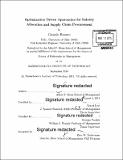Optimization driven approaches for subsidy allocation and supply chain procurement
Author(s)
Romero, Gonzalo (Gonzalo Ignacio Romero Yáñez)
DownloadFull printable version (10.61Mb)
Other Contributors
Sloan School of Management.
Advisor
Retsef Levi and Georgia Perakis.
Terms of use
Metadata
Show full item recordAbstract
This thesis introduces several new models in operations management, that are motivated by practical settings. It studies these models in an optimization-driven approach, employing mathematical programming techniques to derive important structural and algorithmic insights on the corresponding problems. In the first part of the thesis, we study subsidy allocation problems under budget constraints and endogenous market response, where the central planner's objective is to maximize the market consumption of a good. We first consider co-payment subsidies, that are paid to manufacturing firms per unit sold. We focus on "uniform co-payments", in which each firm receives the same co-payment, regardless of its cost structure, or efficiency. Uniform co-payments are frequently implemented in practice. Therefore, a natural question is whether uniform co-payments are in fact the best that the central planner can do; or, more generally, how do they perform compared to the optimal co-payment allocation? Notably, we first identify relatively general sufficient conditions such that uniform co-payments are optimal, even if the firms are heterogeneous, and if the central planner is uncertain about the market response. We then complement the effectiveness of uniform co-payments, by studying a very relevant setting where they are not optimal. We show that, for any instance of this model, uniform co-payments are guaranteed to induce at least 85% of the optimal market consumption. In summary, uniform co-payments turn out to be surprisingly powerful in maximizing the market consumption of a good. We then consider lump sum subsides, which are an alternative subsidy mechanism also implemented in practice. We show that the problem of optimally allocating lump sum subsidies is NP-hard, and discuss two simple allocation policies that have good performance guarantees. In the second part of the thesis, we introduce a model to incorporate the cost of handling orders at a central distribution center, into the procurement decisions of a company. We show how structural results for this model lead to a practical method to select the best case pack size per SKU in procurement contracts, as well as to serve orders at the distribution center. Furthermore, we test this method on real data from a large utility company, finding significant total cost reductions.
Description
Thesis: Ph. D., Massachusetts Institute of Technology, Sloan School of Management, 2014. Cataloged from PDF version of thesis. Includes bibliographical references (pages 179-184).
Date issued
2014Department
Sloan School of ManagementPublisher
Massachusetts Institute of Technology
Keywords
Sloan School of Management.